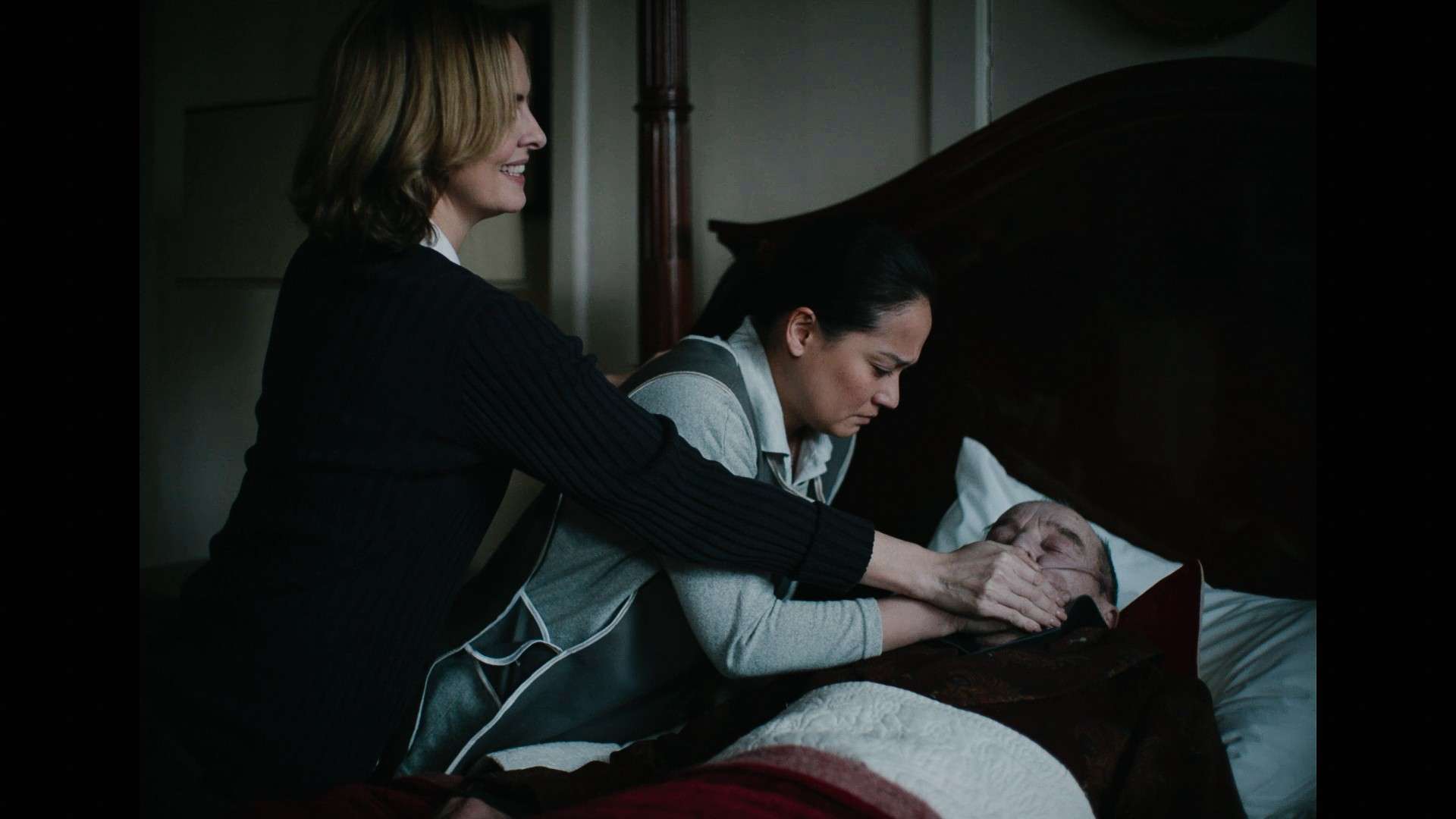There’s a cheekiness that abounds in Paris Zarcilla’s film Raging Grace. It is sharp and kinetic. The film begins with this propulsive score that kicks in at frequent intervals, jolting in an edge, almost reminding us that we cannot expect comfort or settle too easily in its world. Zarcilla has designed it to be bracing and unsettling in consonance with the regular minutiae of the immigrant narrative that lies at the very center of the film. In this, the film consciously adopts a tough social conscience. With genre tricks at its disposal, Zarcilla’s film slyly works in anxieties central to the immigrant experience, vitally layering it with resonances that hark across generations.
Crucially, the film foregrounds the repetitiveness of immigrant lives spent and wasted in devotion and service to the colonial master, raising their families at the expense of their own. Zarcilla acknowledges these pained ties made between the past and present, a character in the latter timeframe taking lessons from mistakes and sacrifices of someone in the former, paving the way for greater audacity that the upcoming generation can take on and thereby challenge.
Raging Grace (2023) Movie Review:
Zarcilla divides the film into chapters, whose titles are drawn from Rudyard Kipling. The importance of this chosen connection dawns early, but Zarcilla also tends to go for overkill with the titles, resorting to cliched ones as “white man’s burden.” The sheer obviousness of these establishing threads veers dangerously to the pedantic. The film has a problem of tending to rely too heavily on its most defining strengths. One can quibble the same about Jon Clarke’s music, which, when first initiated, has an immediate, sharp effect.
This skids off to a forgettable blur as the film leans too closely to a swell of score for amping the mood when the screenplay goes slim and wobbly. It’s as if the film cannot trust itself to pull the viewer along the tide of its pulsating narrative therefore, it falls back on these appendages. Sure, score is a big element of the genre film, and this is by all accounts a film that is supremely aware of its genre trappings and how it wishes to deploy it at specific critical junctures indicate a fresh, innovative mind at work. However, the theme mottling the genre or the theme limning the genre end of the film is occasionally driven too far, risking a thinning of characterization to achieve a sort of circularity and payoff.
The film concerns itself with a Filipina single mother, Joy (Max Eigenmann). She has landed with her daughter, Grace ( Jaeden Paige Boadilla), in London. She works several housekeeping jobs to scrape by a living, dreaming she will one day buy a house where she can live with her daughter. Grace is constantly up to no good, leaping about and playfully interrupting any sort of predictable order and stability her mother desires. She is uncontrollably mischievous which ensures Joy is never in any moment at complete ease.
Zarcilla taps this disconcerting edge to Grace to fuel the distinctive surprise and the sleek, unnoticed movements that creep up on the characters of the film. Joy is perpetually on the lookout for her daughter lest she do something untoward. Grace is either always playing games or sneaking around the houses where her mother is a cleaner and a help. The film evokes this notion of the errant girl on the loose, unleashed and sending the whole place into a mayhem. Grace is its embodiment as her run-ins into undesired, hidden areas eke out the film’s bristling themes.
It is when Joy is asked to check in on a friend’s acquaintance at a far-flung mansion that the film flashes its delicious underside. Joy is extremely resourceful, and she lands a job as the housekeeper appointed by Katherine (Leanne Best), the niece of the bedridden old man, Garrett (David Hayman), about whom she had been sent to enquire. Katherine is very prim, but she is not quite alert to what actually goes on around her.
Joy doesn’t tell her she has a daughter, so she brings Grace tucked away hidden inside her trolley. She insists that Grace stick to the room assigned for her to stay. But Grace doesn’t readily take to instructions. The discoveries Grace makes, pushing her mother to realize what’s actually happening, form the axis of interrogation the film is premised on. Zarcilla taps her free-spirited transgressions and disobedience to spin out a wickedly entertaining film that measures the cost of colonial heritage and the price the empire owes to her subjects.
What does Grace discover?

Grace is a sharp kid who looks at and ferrets into spaces she ought not to. In several ways, at night, she sneaks out of bed and comes across a sleepwalking Katherine. She follows her into a dank room where, at one end, there is an old woman who lies encased in a glass panel. She is presented as the most audacious, promising future of her Filipino roots, which have largely been in subservience to the white masters. Grace finds out Katherine is administering sleeping drugs to Garrett, forcing him into a chemically induced coma.
Joy is shocked, and she sets to making Garrett well, relying on the knowledge of a past job that involved medicine. Garrett recovers fully eventually, telling Joy he is indebted to her promising her he will fix her visa issues. As Katherine is away during this time, they bond, but Garrett draws the line of authority firmly. He is also well-versed in Filipino, recounting how he had a Filipina nanny who was dearer to him than his own mother.
How does Katherine react on her return?
Katherine is startled to find Garrett well and active. But she informs him that she has already rendered him incapacitated in legal documents, the estate now being all hers. Garrett springs a cruel surprise on her, telling her how he goaded her into ensuring her mother is sent away to an asylum, and her fortune siphoned off and put at his disposal.
Raging Grace (2023) Movie Ending Explained:
Joy goes digging into a bunch of old letters stacked away in the cupboards. She realizes all the letters Garrett’s Filipina nanny, Gloria, wrote to her family back home were all deliberately held up by him. He ensured they never got posted. Gloria kept writing despite no replies and eventually gave up hope, accepting Garrett’s family as her own. A horrified Joy tries to take Grace and flee, but her daughter is adamant about staying. Suddenly, police officers arrive at the mansion, looking for an illegal immigrant. Joy is instantly taken away in detention.
Later that night, as she attempts to administer him the sleeping drug, Grace sneaks up and injects her, on the plotting of Garrett, essentially sending Katherine into a hallucinatory state. Soon, Grace starts demanding that Garrett take her to her mother. He himself had called for the officers. As Grace tries to escape, she bolts for the room where Gloria is encased. Garrett pursues her, and she pushes the case onto him, trapping him.
A fire erupts. Grace is hauled back by Garrett, but Katherine comes in and shoves her aside. As Garrett languishes under the case, the fire chewing up the house, Katherine and Grace get out. In the film’s closing scenes, Katherine reassures Joy about her visa, recommending a lawyer who can represent her. Finally, Joy takes Grace to meet her father, who is married.




![The Hole in the Ground [2019] Review: Squandered Potential](https://79468c92.delivery.rocketcdn.me/wp-content/uploads/2019/08/the-hole-in-the-ground-1-768x432.jpg)



